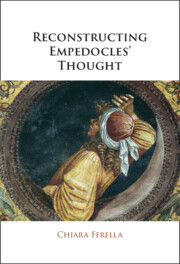Book contents
- Reconstructing Empedocles’ Thought
- Reconstructing Empedocles’ Thought
- Copyright page
- Dedication
- Contents
- Acknowledgements
- Introduction
- Chapter 1 Reconstructing Empedocles’ On Nature
- Chapter 2 The Proem to On Nature
- Chapter 3 Daimones between Plato and Pythagoras
- Chapter 4 Divine Beings
- Chapter 5 Changes of Form, Personal Survival and Rebirth
- Chapter 6 Knowing Nature as a God
- Chapter 7 Cosmic Cycle, Moral Import and Rebirth
- Chapter 8 Epilogue
- Bibliography
- Index
Chapter 4 - Divine Beings
Published online by Cambridge University Press: 01 February 2024
- Reconstructing Empedocles’ Thought
- Reconstructing Empedocles’ Thought
- Copyright page
- Dedication
- Contents
- Acknowledgements
- Introduction
- Chapter 1 Reconstructing Empedocles’ On Nature
- Chapter 2 The Proem to On Nature
- Chapter 3 Daimones between Plato and Pythagoras
- Chapter 4 Divine Beings
- Chapter 5 Changes of Form, Personal Survival and Rebirth
- Chapter 6 Knowing Nature as a God
- Chapter 7 Cosmic Cycle, Moral Import and Rebirth
- Chapter 8 Epilogue
- Bibliography
- Index
Summary
Chapter 4 deals with several concepts, most of them introduced in the proemial fragments, that translate Empedocles’ idea of the divine. In order both to address the disputed question of what can be considered true gods in Empedocles’ physical system and to explore some of the details of his belief in rebirth by defining what the final promise of divine reward entails, I analyze the entities Empedocles explicitly refers to as gods. Several entities are made equally divine, yet each of them is divine for different reasons, although some of them also share common qualities that allow us to delineate a notion of the divine. In this regard, as far as living beings are concerned, we can conclude that for them to be (or become) gods means having a divine status that is modelled on the divine characteristics of Sphairos, the perfect form of the universe and cosmic god. These characteristics are associated with Love as opposed to Strife and include purity, stability (continuity), symmetry and beauty, bliss and perfect knowledge. In this sense, the divine nature of Sphairos represents Empedocles’ paradigm of godhood in the cosmos to which all living beings aspire.
- Type
- Chapter
- Information
- Reconstructing Empedocles' Thought , pp. 185 - 216Publisher: Cambridge University PressPrint publication year: 2024

